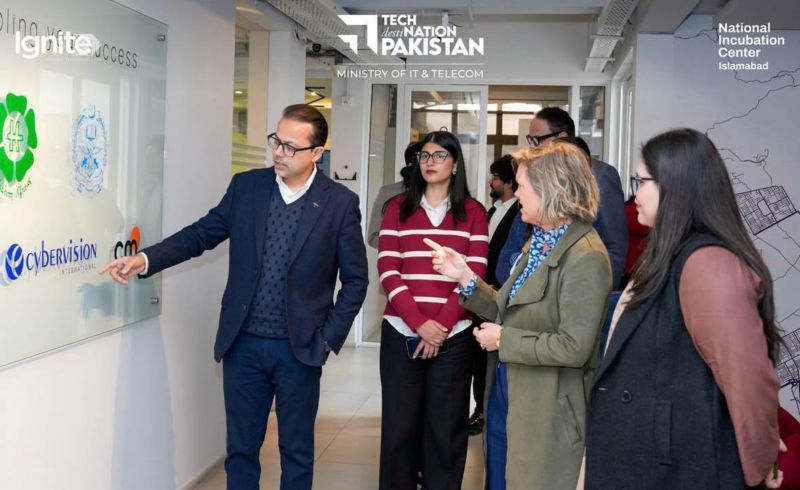From semiconductors to AI hubs how this alliance could redefine Pakistan’s tech landscape.
The Pakistan Saudi Arabia collaboration on artificial intelligence and semiconductor technology marks a major milestone in both nations’ digital transformation journeys. As global competition in AI intensifies, this partnership aims to position Pakistan as a rising tech hub while leveraging Saudi Arabia’s Vision 2030 to drive regional innovation and sustainable growth.
This isn’t just another bilateral announcement. It’s a calculated move to build capability, attract investment, and empower talent, with real programs already underway and the potential to unlock billion-dollar industries.
A Partnership Taking Root
The collaboration gained traction with the announcement of the GO AI Hub Pakistan, launched by Saudi Arabia’s GO Telecommunications Group. This initiative will serve as a regional hub for AI innovation, training, and joint research, connecting Saudi expertise with Pakistan’s fast-growing tech talent pool. This aligns closely with the vision set out in A Deep Dive into Pakistan’s AI Policy 2025: Vision, Strategy, and What It Means for Startups and Investors.
Meanwhile, Pakistan’s government approved a Rs 4.8 billion program to train 7,000 youth in semiconductor technologies in sync with Saudi Arabia’s National Semiconductor Hub (NSH) and National Technology Development Program (NTDP), pillars of Riyadh’s Vision 2030. These developments build upon infrastructure goals echoed in Islamabad IT Park to Bring New Hope for Startups, which highlights the importance of dedicated facilities and data center capacity for tech scale-ups.
These moves are complemented by broader frameworks: MoUs spanning AI, cybersecurity, digital infrastructure, agri-tech, and industrial innovation. Similar multi-sector strategy is seen in Pakistan Races to Accelerate AI: Government to offer Incentives to Drive Nationwide Integration.
Why This Matters for Pakistan
For Pakistan, this partnership could become the catalyst that finally connects its talent-rich but resource-poor tech ecosystem with global-scale opportunity.
Despite producing thousands of engineers annually, Pakistan’s AI and semiconductor sectors have remained nascent, hindered by limited infrastructure, R&D investment, and capital access. Now, with Saudi backing, Pakistan stands to gain from:
- Advanced technical training and certification in AI, chip design, and data systems.
- New inflows of foreign investment into data centres, cloud platforms, and innovation parks.
- Startup opportunities in applied AI, robotics, agri-tech, fintech, and healthtech.
- Market access to Saudi Arabia’s fast-growing innovation ecosystem and digital economy.
Real-world examples of nascent innovation include students building tools like GeoGemma, an AI tool democratizing satellite imagery analysis.
The Sectors Poised to Take Off
1. Artificial Intelligence & Cloud Computing
AI research and cloud infrastructure projects will create opportunities for startups building tools in automation, analytics, and digital governance. Pakistan’s growing cloud market could finally see institutional investment and cross-border collaboration.
2. Semiconductors & Hardware
Pakistan’s entry into semiconductor design and manufacturing through Saudi training partnership marks a landmark shift. Access to R&D hubs and fabrication labs in Riyadh could enable local firms to step into chip design, embedded systems, and IoT hardware.
3. Cybersecurity
With both nations emphasizing digital sovereignty and secure data handling, the need for cybersecurity services will expand rapidly. Pakistani cybersecurity startups and professionals are likely to find opportunities in both public and private Saudi projects.
4. EdTech & Digital Skills
Expect major funding in AI-focused EdTech programs and certification platforms. Training initiatives under the partnership will help Pakistan’s youth become globally competitive in high-tech domains.
5. AgriTech & HealthTech
AI-based precision agriculture and digital health systems are priority sectors in both countries’ digital transformation plans. Joint R&D could produce scalable solutions for climate adaptation, smart irrigation, and telemedicine.
Challenges That Need to Be Tackled
Execution will be key. Pakistan’s energy shortages, regulatory ambiguity, and infrastructure bottlenecks could slow implementation. Moreover, without clear retention strategies, trained AI professionals might leave for higher-paying markets abroad.
Experts also warn that policy alignment is essential. Pakistan’s upcoming National AI Policy 2025 must integrate with Saudi Arabia’s AI ethics and data governance frameworks to ensure smooth collaboration and technology exchange.
A Shared Vision for the Future
At its core, this alliance reflects a shared ambition to shift from resource-driven to knowledge-driven economies. Saudi Arabia’s Vision 2030 aims to diversify beyond oil, while Pakistan’s Digital Pakistan initiative seeks to digitize government, industry, and education.
By combining Pakistan’s human capital with Saudi Arabia’s financial and technological resources, both countries can create a regional innovation corridor stretching from Karachi to Riyadh, one capable of competing in AI development, cloud infrastructure, and digital services.
For startups and innovators, this partnership isn’t just symbolic, it’s a signal. Aligning with national priorities such as AI applications, automation, and smart solutions can open doors to cross-border investment, pilot projects, and acceleration programs in both countries.
The Road Ahead
The establishment of the GO AI Hub Pakistan and the semiconductor training program mark the start of a new era, one where Pakistan isn’t just an AI consumer, but a contributor.
If executed effectively, this partnership could elevate Pakistan’s standing as a regional tech collaborator, enabling its startups and engineers to co-create the next generation of intelligent systems with the Gulf.The future of AI in Pakistan, it seems, will be written in part in collaboration with Riyadh.
FAQ
It’s a bilateral initiative focused on artificial intelligence, semiconductor training, and digital infrastructure, including the launch of the GO AI Hub Pakistan.
Startups in AI, robotics, agri-tech, and healthtech will gain access to investment, training, and market linkages through Saudi-backed innovation programs.
The goal is to transform both economies into knowledge-driven ecosystems, create regional innovation hubs, and develop skilled AI talent ready for the global market.




